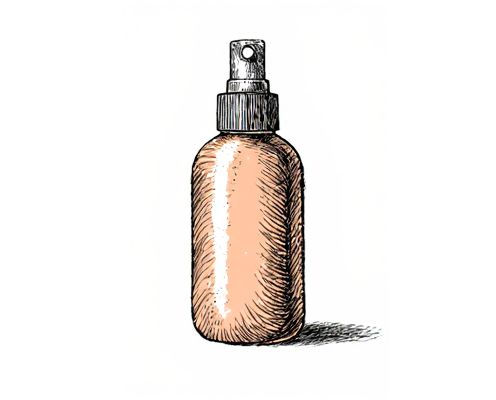
Fungal acne-safe product Illustration
Choosing a fungal acne-safe product is essential for maintaining clear and healthy skin without triggering breakouts. These products are formulated without ingredients like esters, polysorbates, and certain fatty acids that can worsen fungal acne. Using fungal acne-safe skincare helps soothe inflammation while supporting the skin's natural barrier and microbiome balance.
Understanding Fungal Acne: Causes and Symptoms
Fungal acne, caused by the overgrowth of Malassezia yeast, presents as small, itchy red bumps typically appearing on the forehead, chest, and back. Its symptoms often include uniform pustules that do not respond to traditional acne treatments, and persistent itchiness or irritation. Identifying fungal acne correctly is crucial for selecting safe skincare products that avoid exacerbating the condition, such as those free from oily and pore-clogging ingredients.
Key Ingredients to Avoid in Beauty Products
Fungal acne-safe beauty products must avoid ingredients like esters, polysorbates, and fatty acids such as oleic acid that feed Malassezia yeast, the root cause of fungal acne. Common triggers include heavy oils like coconut oil, squalene, and certain myristates which exacerbate fungal growth and inflammation. Opting for lightweight, non-comedogenic ingredients like glycerin and niacinamide helps maintain clear, balanced skin without aggravating fungal acne conditions.
Top Fungal Acne-Safe Ingredients for Healthy Skin
Your skincare routine benefits from fungal acne-safe products containing key ingredients like zinc pyrithione, niacinamide, and salicylic acid, which help reduce Malassezia yeast without clogging pores. These ingredients work synergistically to maintain healthy, balanced skin while preventing inflammation and breakouts commonly associated with fungal acne. Choosing formulations with these components ensures effective treatment and long-term skin health.
How to Identify Fungal Acne-Safe Products
Fungal acne-safe products are specifically formulated without ingredients like fatty acids, esters, and polysorbates that feed the Malassezia yeast responsible for fungal acne. Look for labels that highlight "Malassezia-safe," "fungal acne-friendly," or list ingredients such as zinc pyrithione, sulfur, and ketoconazole known to combat fungal growth. Avoid heavy oils like coconut oil, and opt for non-comedogenic, oil-free moisturizers and cleansers to prevent flare-ups and maintain clear skin.
Best Skincare Routine for Fungal Acne-Prone Skin
Choosing fungal acne-safe products involves using cleansers with gentle, non-comedogenic ingredients like zinc pyrithione, sulfur, or selenium sulfide to reduce Malassezia yeast growth. Incorporating lightweight, oil-free moisturizers and avoiding heavy occlusive oils such as coconut and olive oil helps maintain skin balance without triggering fungal acne flare-ups. A skincare routine featuring salicylic acid for exfoliation and consistent use of antifungal treatments ensures effective management of fungal acne-prone skin.
Recommended Cleansers for Fungal Acne
Recommended cleansers for fungal acne feature ingredients like zinc pyrithione, selenium sulfide, and ketoconazole that target Malassezia yeast without disrupting the skin's protective barrier. Non-comedogenic, fragrance-free formulas reduce irritation and prevent flare-ups, making them essential for managing fungal acne effectively. Regular use of these specialized cleansers helps maintain a balanced scalp and skin microbiome, promoting clearer, healthier skin.
Moisturizers That Support Fungal Acne-Free Beauty
Moisturizers formulated with fungal acne-safe ingredients like squalane, hyaluronic acid, and ceramides help maintain hydration without triggering Malassezia growth. Products free from esters, polysorbates, and fatty acids are essential to prevent fungal acne breakouts. Using lightweight, non-comedogenic moisturizers can support a clear and balanced skin barrier, promoting healthier fungal acne-free beauty routines.
Makeup Tips for Sensitive, Fungal Acne-Prone Skin
Choose non-comedogenic, oil-free makeup products labeled as safe for fungal acne to prevent breakouts and irritation on sensitive skin. Mineral-based foundations and lightweight, water-based formulas provide breathable coverage that minimizes pore clogging and fungal growth. Always cleanse thoroughly with gentle, antifungal cleansers before applying makeup to maintain clear, healthy skin.
Common Myths About Fungal Acne and Beauty Products
Many beauty products contain ingredients like esters, polysorbates, and certain fatty acids that can worsen fungal acne by feeding the yeast Malassezia. You should avoid products labeled as "non-comedogenic" alone, since this does not guarantee they are fungal acne-safe. Understanding common myths--such as assuming all natural or oil-free products are safe--helps in selecting treatments that effectively manage fungal acne without flare-ups.
Long-Term Skin Health: Preventing Fungal Acne Recurrence
Using fungal acne-safe products with antifungal ingredients like zinc pyrithione, sulfur, or ketoconazole supports long-term skin health by preventing the recurrence of fungal acne. These formulations maintain a balanced skin microbiome, reducing excess yeast growth while soothing inflammation and irritation. Consistent use helps strengthen the skin barrier, minimizing flare-ups and promoting clearer, healthier skin over time.
 womendy.com
womendy.com